|
|
 |
Dusted Reviews
Artist: Ekkehard Ehlers & Paul Wirkus Album: Ballads Label: Staubgold Review date: Jul. 27, 2009 |

|
|
|
 |
One of Ekkehard Ehlers’s many positive attributes is his willingness to play extremely fast and loose with his concepts. The compositions in the Plays series bore only tangential relationships to their subjects – was Ehlers commenting on the futility of meaningful tribute, or was that comment in itself the ultimate tribute to singular figures like Albert Ayler and John Cassavettes? To really “play” those subjects would be to speak from the heart to the listener without a mediating influence. One gets the feeling that Ehlers could have labeled the album after the fact to make the point, but the subtleties in the recording enhance the album by showing a real attempt to understand the issue.
On the extraordinary A Life Without Fear, Ehlers employed both subtle and not-so-subtle allusions to the history of the blues, autopsied the form, and found something quite primal. Whereas most sound artists are unable to communicate much beyond disorientation or simple correspondences (noise = anger, noise = bliss, noise = whatever), Ehlers was actually able to wed his sound design to the emotions that underlie most traditional forms of music. And it is quite something to hear “O Death” accurately and adequately expressed through sound. It wasn’t “blues”; just blues.
If I’m focusing on Ehlers at the expense of Paul Wirkus, it’s because the title of their collaboration raises questions that Ehlers typically asks. Ehlers has been quoted as saying that “maybe it’s a jazz record,” and apparently there’s an Alice Coltrane sample buried in here, but much more so than in the above-mentioned releases, overt references have been scrubbed clean. As such, Ballads is a somewhat inscrutable record that doesn’t quite justify or explain its strong title.
Of course, the listener could be the one responsible for that heavy lifting, but I get the sense that Ehlers and Wirkus mostly intended this album to be a genial exchange of ideas. Interestingly enough, Ehlers also said that he and Wirkus deliberately avoided loop structures on these tracks, though those structures tend to produce both artists’ best moments (Plays Cassavettes and the quiet, relaxed repetition on Wirkus’s Déformation Professionnelle). The results are certainly in the spirit of avant-jazz interplay, as the artists jointly map out the album’s unexpected paths.
It’s curious that Ehlers and Wirkus would stunt their trademarks and allow the impersonal nature of the glitch to democratize their contributions. Jazz doesn’t need solos, but it does depend on individual voices. The best moments on Ballads are the ones where Wirkus’s drumming, Kai Fagaschinski’s clarinet, and the bass work of Achim Tang and Werner Dafeldecker come to the fore. These moments aren’t groundbreaking in the ways that Plays or Heroin are, but they make for excellent and hallucinatory music in their own right. That “maybe” in Ehlers’s above statement shows that he and Wirkus haven’t really committed themselves to a theory behind the album, but as a straightforward listen, Ballads has its rewards.
By Brad LaBonte
|







